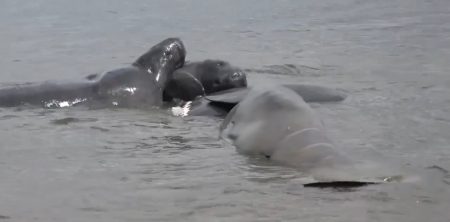- The only danger the animals are in is the danger of not getting some.
Just this week, we brought you sad news about Hugh, the famous Florida manatee. He died earlier this year when mating season hormones drove him to get it on with his brother, Buffett.
But Hugh and Buffett aren’t the only manatees who wanted some lovin’ this summer — far from it. It’s currently the tail end of the manatee mating season, and it’s prompted the police in Florida to issue a statement.
Namely, they’re kindly asking people to stop calling them to break up manatee orgies.
“If you see this, don’t call us,” the Pinellas County Sheriff’s Office (PCSO) said on social media, referring to a heaving, squirming mass of manatees in shallow water.
You see, manatees like to get their freak on in groups known as mating herds. There are a lot of flailing flukes, slapping flippers, and all other kinds of erratic movements when the massive mammals get hot and bothered.
A passerby who’s not well-versed in the intricacies of manatee lovemaking might think the animals are in trouble. But they aren’t — unless that’s how they like it.
“We get calls all the time from citizens when they see [a mating herd], believing the manatees are in distress,” the PCSO said.
“We can assure you, they are more than fine.”
In fact, it’s important for you to allow the fleshy, blubbery event to continue. Florida manatees have been dying off recently, so we have to let them replenish their numbers in peace.

How to Form a Mating Herd
But how are you supposed to tell whether a manatee herd is banging or in need of help? FWC Fish and Wildlife Research Institute released a Facebook video explaining the finer details of manatee mating to help people make that distinction.
Manatees can mate all year round, but their prime season for love is in the summer months. It’s common to spot the waters roiling with amorous manatees between May and September.
The spectacle begins when a female manatee releases pheromones into shallow coastal waters to summon the mating herd. We didn’t try finding out how she does this — we’ll just assume it has something to do with secretions we don’t want to know about.
As males catch a whiff of the female, they arrive in numbers to the female. They then begin competing for mating rights, which is what people may mistake for fighting.
The manatees will climb over each other and the womanatee, attempting to get underneath her for some sugar. The scene can seem relatively peaceful at times before exploding in flapping flippers and splashing water.
As the day goes on, the male manatees may leave to go grab lunch before coming back for round two — or three or four. Meanwhile, the female generally stays put in the shallow water until she decides she’s had enough.
At times, the mass of males might push the female into deeper water. That’s when the herd gets the most riotous as the female attempts to swim back to the shore while the males keep trying to do their thing, and her.
Do Nothing and Only Nothing
So, what should you do if you notice a manatee mating herd? The answer is nothing.
You should make absolutely sure not to bother the animals for a few good reasons. The first — and perhaps most obvious — reason is that it’s dangerous.
The manatees will be focused on mating and may not notice your approach. With their attention on the female, they could easily slap you or roll on top of you.
And if they do notice you, they could get angry. Let’s just say that blue-balling a 1.5-ton mass of muscle and fat in its natural element may not end well for you.
Even if you happened to get away unscathed from approaching the manatees, you could distract them and — as FWC Fish and Wildlife Research Institute put it — prevent nature from taking its course. If you like manatees and want to see them around in the future, that’s not something you should do.
Florida’s estimated 6,500-8,500 manatees have been experiencing a phenomenon known as an unusual mortality event (UME) since 2020. In short, they’re dropping dead in strangely high numbers, which isn’t good for the already threatened animals.
The worst year was 2021 when more than 1,000 manatees died for various reasons, mostly winter-time starvation. The following year saw around 700 deaths, and this year we’ve lost almost 400 manatees — and it’s only early August.
This is why it’s vital to let the manatees do their thing in peace. If we don’t, there may soon be no manatees to disturb beachgoers with their flabby orgies.
Hits: 0













